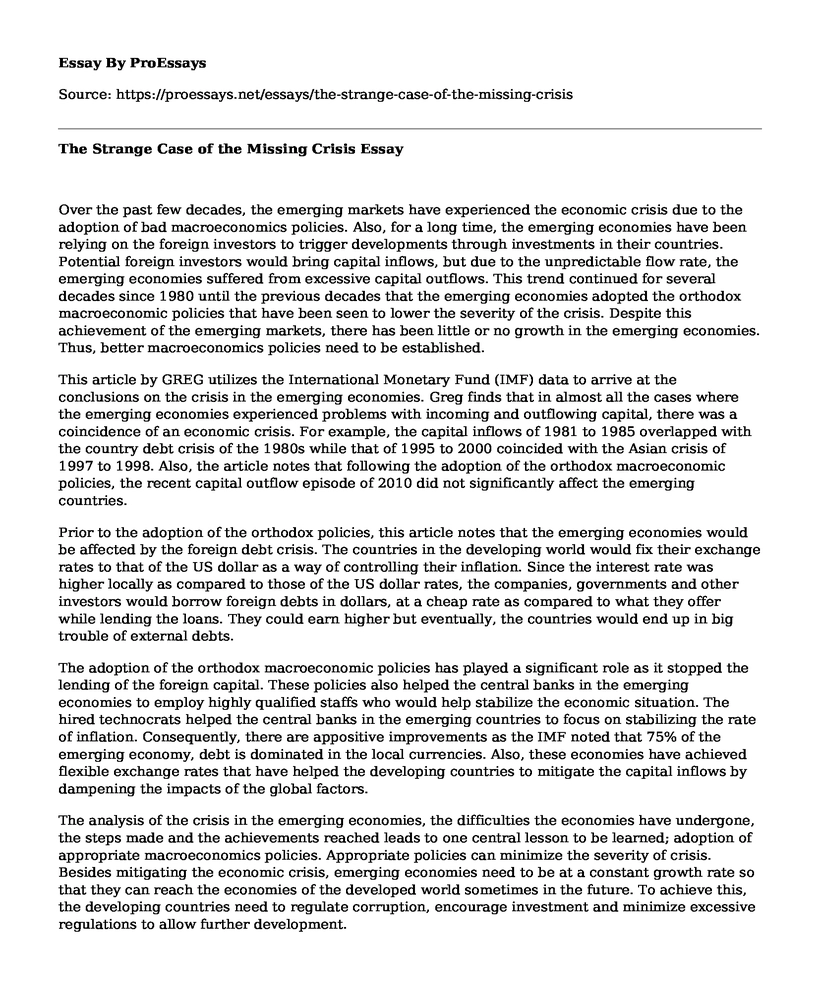Over the past few decades, the emerging markets have experienced the economic crisis due to the adoption of bad macroeconomics policies. Also, for a long time, the emerging economies have been relying on the foreign investors to trigger developments through investments in their countries. Potential foreign investors would bring capital inflows, but due to the unpredictable flow rate, the emerging economies suffered from excessive capital outflows. This trend continued for several decades since 1980 until the previous decades that the emerging economies adopted the orthodox macroeconomic policies that have been seen to lower the severity of the crisis. Despite this achievement of the emerging markets, there has been little or no growth in the emerging economies. Thus, better macroeconomics policies need to be established.
This article by GREG utilizes the International Monetary Fund (IMF) data to arrive at the conclusions on the crisis in the emerging economies. Greg finds that in almost all the cases where the emerging economies experienced problems with incoming and outflowing capital, there was a coincidence of an economic crisis. For example, the capital inflows of 1981 to 1985 overlapped with the country debt crisis of the 1980s while that of 1995 to 2000 coincided with the Asian crisis of 1997 to 1998. Also, the article notes that following the adoption of the orthodox macroeconomic policies, the recent capital outflow episode of 2010 did not significantly affect the emerging countries.
Prior to the adoption of the orthodox policies, this article notes that the emerging economies would be affected by the foreign debt crisis. The countries in the developing world would fix their exchange rates to that of the US dollar as a way of controlling their inflation. Since the interest rate was higher locally as compared to those of the US dollar rates, the companies, governments and other investors would borrow foreign debts in dollars, at a cheap rate as compared to what they offer while lending the loans. They could earn higher but eventually, the countries would end up in big trouble of external debts.
The adoption of the orthodox macroeconomic policies has played a significant role as it stopped the lending of the foreign capital. These policies also helped the central banks in the emerging economies to employ highly qualified staffs who would help stabilize the economic situation. The hired technocrats helped the central banks in the emerging countries to focus on stabilizing the rate of inflation. Consequently, there are appositive improvements as the IMF noted that 75% of the emerging economy, debt is dominated in the local currencies. Also, these economies have achieved flexible exchange rates that have helped the developing countries to mitigate the capital inflows by dampening the impacts of the global factors.
The analysis of the crisis in the emerging economies, the difficulties the economies have undergone, the steps made and the achievements reached leads to one central lesson to be learned; adoption of appropriate macroeconomics policies. Appropriate policies can minimize the severity of crisis. Besides mitigating the economic crisis, emerging economies need to be at a constant growth rate so that they can reach the economies of the developed world sometimes in the future. To achieve this, the developing countries need to regulate corruption, encourage investment and minimize excessive regulations to allow further development.
Cite this page
The Strange Case of the Missing Crisis. (2021, Mar 13). Retrieved from https://proessays.net/essays/the-strange-case-of-the-missing-crisis
If you are the original author of this essay and no longer wish to have it published on the ProEssays website, please click below to request its removal:
- Challenges Facing Dubai - Research Paper Example
- Geographical Expansion of Business Essay
- Immigrants and Firms Productivity Essay Example
- Essay on the Great Recession: Bailouts as a Government Response
- Local Governments Grapple With Financial Crises: Bowling Green Kentucky Case Study
- Essay Example on Rising Poverty in Seoul: Impact of 21st Century Economic Crisis
- Essay Sample:The Great Recession's Impact on People with Disabilities







